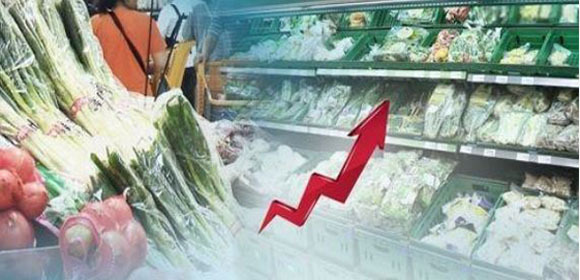Korea‘s consumer prices rise at fastest pace in more than 5 yrs in Aug.
By YonhapPublished : Sept. 1, 2017 - 10:15
South Korea's consumer prices rose at the fastest pace in more than five years in August due mainly to a sharp increase in food prices, government data showed Friday.
The country's consumer price index advanced 2.6 percent last month from a year earlier, up from the previous month's 2.2 percent rise, according to the data compiled by Statistics Korea.
The August inflation marked the highest gain since April 2012, when it also hit 2.6 percent.
From a month earlier, the index went up 0.6 percent in August.
Core inflation, which excludes volatile oil and food prices, also increased 1.4 percent on-year.
The country's consumer price index advanced 2.6 percent last month from a year earlier, up from the previous month's 2.2 percent rise, according to the data compiled by Statistics Korea.
The August inflation marked the highest gain since April 2012, when it also hit 2.6 percent.
From a month earlier, the index went up 0.6 percent in August.
Core inflation, which excludes volatile oil and food prices, also increased 1.4 percent on-year.

The statistics office attributed the upbeat inflation to a monthslong drought in the spring, and floods and heat waves in the summer.
Prices of fresh fruit soared 22.8 percent on-year in August, while those of vegetables also moved up by the same number on-year.
In particular, prices of tomatoes soared 45.3 percent and those of grapes surged 31.6 percent last month.
"Last month, the weather was not good. It was hot and rainy throughout," said Woo Young-jae, director of the price statistics division at the statistical bureau. "Bad weather hurt the supply of farm products."
South Korea's agricultural sector has been suffering from the drought that started in the winter and worsened over the spring and summer months, while some central regions were hit by floods that came with the seasonal rainy season.
Meanwhile, the bullish pace of petroleum prices, which have been the biggest mover to push up the consumer prices index for months, continued last month, with their index rising 3.6 percent on-year, up from 0.5 percent gain in July.
"The sharp increase in August inflation is largely caused by one-off factors. The figures will fall back down to around the 2 percent level in the coming months," Woo said. "But when we see the core inflation, which excludes food and oil prices, it remains steady and even lower than the target inflation rate of 2 percent." (Yonhap)







![[KH Explains] Hyundai's full hybrid edge to pay off amid slow transition to pure EVs](http://res.heraldm.com/phpwas/restmb_idxmake.php?idx=644&simg=/content/image/2024/04/18/20240418050645_0.jpg&u=20240419100350)







![[From the Scene] Monks, Buddhists hail return of remains of Buddhas](http://res.heraldm.com/phpwas/restmb_idxmake.php?idx=652&simg=/content/image/2024/04/19/20240419050617_0.jpg&u=20240419175937)

![[KH Explains] Hyundai's full hybrid edge to pay off amid slow transition to pure EVs](http://res.heraldm.com/phpwas/restmb_idxmake.php?idx=652&simg=/content/image/2024/04/18/20240418050645_0.jpg&u=20240419100350)

![[Today’s K-pop] Illit drops debut single remix](http://res.heraldm.com/phpwas/restmb_idxmake.php?idx=642&simg=/content/image/2024/04/19/20240419050612_0.jpg&u=)